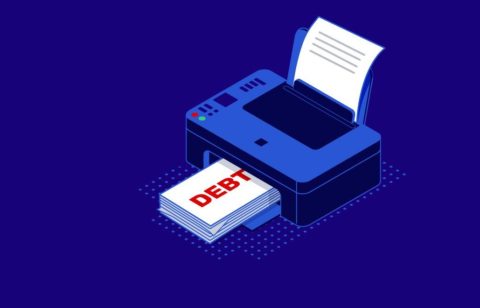When debt begins to get out of hand and the payments are too high to manage easily, it is often easier to roll all the debts into a single consolidation loan. Having someone help by offering a debt management program or debt consolidation loan can be highly effective as a way to reestablish financial control and liberty.
There are a great many ways this can be done. Many times the loans are smaller, closed-end and only enough to cover the accumulated debt of a few bills. Sometimes the financial aid is especially large and strong enough to settle mortgages and lines of home equity credit. No matter the sizes or uses, any of these debt consolidation loans can be refinanced as necessary.
This should never be done unless the borrower is absolutely certain it will improve their current situation. The only way to be sure is to prepare for some serious research into the options available to you on the market. Only after you have fully explored and investigated your options should you make this perilous move.
This FAQ section will cover some of the most important questions you should ask before attempting this type of financial endeavor as well as the major considerations involved. If it seems that you are still encountering difficulty after taking out a debt consolidation loan, here is what you need to know:
Q: What are the major considerations I should keep in mind when considering consolidation or refinancing a consolidation loan?
Before choosing to refinance your loan, you will want to consider many other options that are available to you. You will need to ascertain how close the debt consolidation refinancing is for your situation so that you don’t exacerbate your financial worries.
Furthermore, you will need to be wary of the many swindlers in this market. Many offer unbelievable deals that will solve all your financial woes, but don’t be fooled. Only those with proper licensing or accreditation from proper regulatory boards will provide effective solutions to your problem.
There is also plenty of free advice that you can avail yourself of in your efforts for financial control.
Q: What is the best way to go about finding proper refinancing for my debt consolidation loan?
Remember that debt consolidation is not exactly a one size fits all solution. While it can work perfectly for many situations, efficacy is ensured by matching the best solution to the proper condition. The best way to ensure you are on the right path is to establishing your financial credit history, and the following are some important first steps:
Talk to your current providers — if the payments are getting more and more difficult, try to take it up with your current provider. Many times they will appreciate the effort to address financial responsibility and make you a favorable deal.
Consider switching — Changing your home loan can be another good idea. But be careful, brokers are known to receive bonuses to get you to sign your loan over to a new provider and will tell you anything to close the deal. Don’t go for the first “good” offer that comes through your door. The worst would be a misleading claim about the amounts you will save by transferring the loan. Make a careful note of the offers these people make for future comparisons and consideration.
Sell your home — it may be the most prudent move to just sell the home if you are becoming swamped in mortgage payments. It would be far better to sell the home on your own terms and possibly have a bit of money left over from the transaction to settle any other pressing concerns. It won’t work out the same if the creditors sell the home first.
Find financial counseling — don’t forget that many non-profit organizations that are in place to help those with shaky financial skills become empowered with knowledge and can help anyone out of their financial predicaments. Unless you are an experienced expert in all things financial, this is certainly an important first step.
Furthermore, never trust any refinancing operation that asks you to sign a blank document, pushes the transaction through as fast as possible, or seems shifty about all the hidden bills and repayment schemes before you have even discussed your personal refinancing.
Q: Why are the Interest Rates, Fees and charges an Important consideration?
Because they will affect so much in the long run. If you don’t fully consider how these important particulars will tip the scale in your favor, they may have the opposite effect and exacerbate your financial woes. If your interest rates are higher than they were previously, you will be worse off than before.
Then different lenders and financial institutions have special rules and regulations and can even make additional charges for payments made for paying off loans ahead of schedule. Because this process also involves taking out a new loan in order to address a different loan, these loans could have hidden legal fees, valuation charges, and other surprise expenses that can tilt the balance in an undesirable direction.
Q: Is it important to compare loan terms?
Yes, longer loan terms should be considered a bad sign. Even with lower interest rates on the new loan, if you will be addressing the payments of a short-term loan as part of a long-term plan, you may still end up paying more in the long term. This is why comparing the loan terms will save you cash if you do it right.
Q: Is licensing Important?
It will be important to make sure the company refinancing your consolidation loan is properly licensed for their work. Brokers that are not licensed can’t be held to the same standards of quality assurance and can pose a serious problem for you in the long run. Check with your national regulatory boards before signing on with any lender especially if they are offering you a “killer” deal.
Q: What are the most dangerous refinancing traps to be aware of?
Refinancing is always a bit of a gamble, even more so if you are not fully aware of the many risks involved. Some of the most significant dangers involved:
Getting deeper into debt — Once you have made your decision to refinance your consolidation, every loan broker and their brother will materialize from the woodwork with some incredible scheme. Even those that are “legit” can have devastating consequences if not the correct plan for your situation.
I’m Rich Again! —This frame of mind is bad news because debt consolidation is effectively paying off loans by taking on another possibly heftier loan. This has serious implications, as many people will assume that their credit card debt has been cleared now that it is tucked into the home loan, for example. But what will happen when they run these cards up again?
In the end, if your consolidation loan just increased your overall debts, you haven’t really helped the problem. Furthermore, if you will end up paying more in the long run you may not have chosen the most favorable option for you.
Q: How should I begin searching for a reputable refinancer?
Begin by getting a full understanding of what you need in a refinancing plan. This begins by understanding what your FICO and credit scores are and why this is important to getting a better deal. The higher your credit rating is the better the interest rate you can expect when refinancing your consolidation loan.
You will want to go over these numbers with a fine-toothed comb and make sure there are no discrepancies that could cast you and your financial state in a bad light. Once you have ensured these details are in order you will have a better chance of a favorable interest rate.
Then you need to review the details of your financial situation as a whole. Do this to see if there are any other accounts, loans, or accumulated debts that you would like to have included in your refinancing projects. Take the time to consider what makes the best sense in your consolidation so that you actually make the most of your refinancing. Remember that paying off a debt quickly is far better than trying to refinance it.
Then, take the time to begin organizing all of your important documents for presentation. You will need loan details, bills, expense reports, pay stubs for the last few months, and plenty of bank statements. You will also be provided with a list of necessary documents from the financial institution offering to refinance your loan. This will need to be presented before they will provide you with a consolidation or refinancing quote.
You will find that all you can gather ahead of time will make your process much easier and flow faster. It is a smart idea to have everything on hand ahead of time. Especially because they can ask for an abstract piece of information and it is better to have it on hand then rescheduling your appointment for consideration.
Q: How do I go about finding a good deal?
You will want to find a good list of as many companies as you can. Researching, collecting as many references as possible, as well as phone and online searches are the best ways to find an effective refinancing plan. You will be asked many questions by the lenders about the specifics of your need. This is why having a full knowledge of what you will need, the best length of the loan term, and all other specifics will help you find the best option from the bunch.
But you will actually want to find a few good options, select the top three options that gave you some favorable quotes, and get all the details you can for further comparison. Be sure the details you have collected fit your current needs precisely. Check and double check the interest rates, loan length and all expected monthly payments.
Then select a primary option for your consolidation refinancing. Once the loan has been approved, all the details of the options you have selected will be confirmed. This is when you will want to check and double check the financial situation you are getting into before you sign on the dotted line.
Q: Once my loan is approved, do I just sign then?
Only after you have taken the time to read over the details, examined the interest rates and established what your monthly payments and length of the loan will be you can sign the agreement. It may seem like a lot of wading through legalese, but it’s important to fix minor errors here. The last thing you would want is to end up paying for any oversight after the ink has dried and the loan comes into full effect.
In Conclusion
Refinancing a debt consolidation loan can be done in many ways and through many different sources of financial aid. There are many different options that include a wide variety of interest rates, loan lengths and more. As mentioned, this can be used as an effective way to address pressing financial concerns both in the large and small scale. The biggest caveat that, without proper research and awareness of your financial capacity, it can be pretty harmful.





